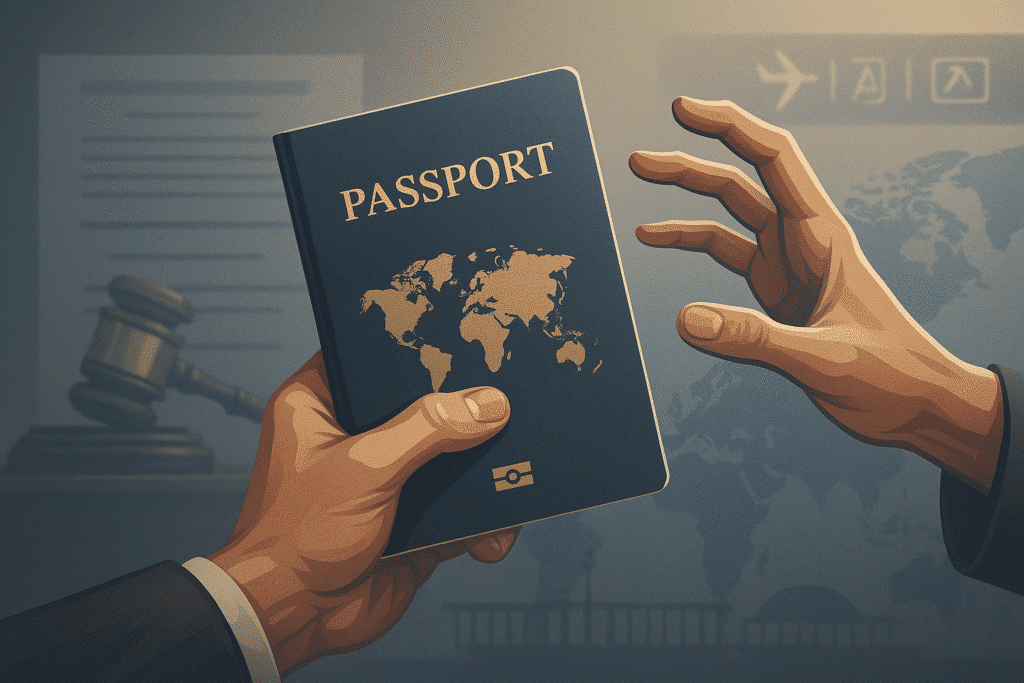
Yes, you can Illegally Possess a Passport. One of the most important identification documents in the world is the passport, which enables one to travel across borders. A situation where someone has been kept without the passport of the other person is subject to serious moral and jurisprudential implications. You may ask yourself whether this is a practice that can be practiced in a given situation.
Throughout this blog, I will walk you through the information, so you have a full picture of Is it Legal to Hold Someone’s Passport? and the consequences that may arise.
Can you hold the Passport of Someone?
Overall, it is illegal to possess the passport of a person without his/her specific authorization. The act may be deemed as an abuse of the freedom of individual movement, as a passport is necessary to exit or enter nations. A passport is the legal property of the government that issues it, and its holder is simply its bearer.
Due to this, holding the passport of a person without their blessings is viewed by many nations as a form of coercion or control and is, in many cases, equated to their loss of freedom. Retaining a passport is effectively denying an individual their right to move freely, and such a case can attract harsh legal consequences depending on the location.
Why Is It Illegal?
- Movement Restriction: Retaining the passport of a person denies them freedom of movement, which is against their fundamental rights.
- Coercion: It is also felt that this is used to coerce people in most circumstances, which is very evident in situations of exploitative labor.
- Human Rights Infringement: This habit is perceived to infringe on the autonomy of the individual and falls under forced labor or human trafficking to extremes.
This is the overall rule, but there are exceptions when it is warranted to hold the passport of a person in certain legal circumstances.
Legal Exceptions to Passport Retention
You know that it is broadly unlawful to keep a passport of a person, but there are some exceptions stipulated by the law. Some of these exceptions can be attributed to upholding law and order, security, or meeting legal requirements.
1. Retention of Twilight Passports
In certain Law enforcement law enforcement agencies are allowed to temporarily keep a passport. This is usually carried out to aid in the investigation or in the enforcement of the rule of law.
Investigation Purposes
Law enforcement agencies, in the case of an investigation, can confiscate passports in the case of reasonable suspicion of unlawful activity. As an example, when you or any other party is subject to criminal investigation, police or any other investigation agencies can hold onto your passport so that you do not run away in the course of the investigation.
Points to consider:
- Temporary Measure: Seizing passports is usually temporary until the investigation concludes.
- Judicial Oversight: Law enforcement agencies must typically obtain court approval to hold someone’s passport.
- Accountability: The passport will be returned once the legal grounds for retaining it no longer exist.
Court Orders to Seize Passport
A passport can be seized by a court upon a need to confirm to legal proceedings or to prevent a person from escaping authority. Such orders have sometimes been made in the following cases:
- Actual litigation: Where a party is suspected to be having the motive of escaping the court by absconding abroad.
- Child custody battles: A parent may restrict the other parent from going out of the country with a child when there is a custody battle at hand.
- Debt recovery disputes: In some nations, seizure of a debtor is permitted to delay his passport until the debtor can pay his debts.

2. Immigration Authorities
There are also cases where the immigration officials can hold the passports. This is always common when you are all in the visa application or other immigration issues.
Processing Visa and Residence Permit
When one is processing their visa, it is not unusual to be asked to hand in a passport. It may be that this is done to secure the legal procedure of making a visa application, residence permit, or other immigration documentation.
Points to note:
- Temporary retention: The immigration agencies hold onto passports, temporarily, only until the documentation is complete.
- It is not something rash: such a practice is justified by law, not a rights violation.
Deportation Cases
In deportation cases, the immigration officials may detain the passports until the deportation is effected. This is in order to streamline the deportation process so that there are no illegal exits out of the country.
Key considerations:
- Promoting deportation: With the passport in hand, the person will be in a situation of compliance with the immigration orders.
- Short-term solution: In most cases, the passport is normally recalled once an individual is deported from a country.

3. Retention of Passports
Retention of passports by employers is a typical phenomenon, particularly in a country with a high population of foreign workers. In some jurisdictions, employers can retain employees’ passports under some employment contracts, but this practice is becoming regulated and criticized.
Employment Contracts
In others, the passports of foreign workers are taken away by their employers as a stipulation of the employment deal. This is particularly in areas that have an influx of migrant workers. In some Middle Eastern states, the custom was traditionally regarded as a means of managing foreign workers.
This has, however, been subjected to a lot of scrutiny owing to the sensitivity of human rights. The retention of passports may also trap employees in exploitative roles because it is extraordinarily hard to exit the country or quit one’s job without the aid of their employer.
Points to understand:
- Legal grey area: Although this practice is still legal in certain jurisdictions, many nations are cracking down on it.
- Possible abuses: Requiring passports in the dynamics of employment has been associated with forced labour and exploitation.
- Altering statutes: Rising global pressure has led to the outright ban on the practice in many countries, underlining the need for voluntary assent.

Consequences of Illegal Passport Retention
In case an individual retains a passport of another individual without a cause, the consequences are dreadful. You could be in serious legal trouble in case of such doings. Here are the potential ramifications of illegally retaining someone’s passport.
1. Legal Charges
Illegal retention of a passport may result in various criminal offenses, depending on the background. These include:
Passport Fraud
Passport fraud can be charged with illegally possessing the passport of a person. Passport fraud is the illegal use, possession, or modification of the passport of another person, and in most jurisdictions is a punishable crime.
False Imprisonment
To deprive a person of their freedom of movement by possessing their passport will lead to your false imprisonment charge. The charge is usually leveled in case one is wrongfully confined or their liberty infringed upon by any other person.
Human Trafficking
Taking a passport and keeping it against such a person with such a move is considered human trafficking. Charges of human trafficking would apply where retention of a passport was a mechanism to control or exploit someone, as in forced labor.
2. Civil Liability
Besides criminal action, one can be held liable in a civil case in case of illegal retention of a passport. The case can be prosecuted in a civil court by the victims seeking damages (emotional distress and forgone wages).
Damages Compensation
Victims of passport retention may seek compensation for any damages they suffered as a result. This might include:
- Financial losses: Like loss of revenue by an inability to travel, i.e., to work or for other reasons.
- Emotional distress: Whether the person was mentally / emotionally impacted by retaining their passport.
3. International Implications
There may be cross-border implications to an unlawful detention of a passport. Diplomatically, a passport offence may cause a strain between nations, particularly when the victim in question is a foreigner.
Diplomatic Tensions
Legal Diplomatic incidents can occur when someone does not maintain a passport in a foreign nation. The government of their country may also intervene, and this may also cause diplomatic tensions.
International Laws and Treaties
International laws, in particular those of human trafficking and forced labor, give more and more attention to the practice of retaining passports. Through this, the international legal system is transforming to fight against such violations with focus on securing the rights of individuals.

FAQs:
Is the confiscation of a passport legal?
No, unless you are legally authorized (ex, police, courts & immigration). Otherwise, it will be illegal.
Is it legal for my employer to have my passport?
Not in the majority of the countries. It is mostly illegal and is agentive to exploitation.
Can courts seize passports?
Yes, to prevent escape in legal cases like lawsuits or custody disputes.
What does international law say?
It considers passport retention without authorization as a human rights offence.
Final Words
In conclusion, retaining the passport of a person without his permission is unlawful unless it is a legal circumstance, such as in the investigation by law enforcers, by a court, or in the immigration line, or sometimes in contracts of employment in some jurisdictions. But the trend in the world today is to have greater control over the practices of retaining passports, particularly involving discussions of labour and human rights.
You need to understand that unlawfully holding a passport of any individual may have grave legal effects, which may include a criminal penalty, civil responsibility, and international diplomatic concerns.

